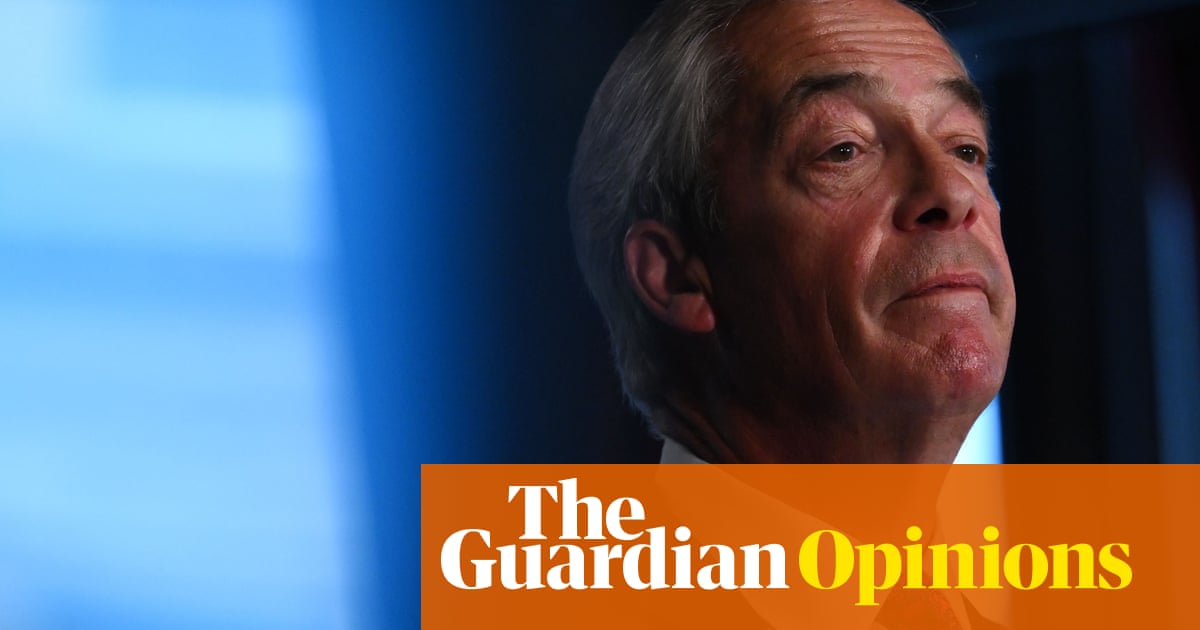In amuch-publicised press conferencelast week in London, Nigel Farage invited Keir Starmer to a one-to-one debate at “a working man’s club” anywhere “in the red wall”. The suggested location was more noteworthy than the debate-me machismo. Its message was clear: having trampled over the Tories in the recent local elections, Reform UK is coming for Labour and nowhere is safe. “Let’s go to one of the former mining communities, let’s go somewhere that Labour has held the seat pretty much consistently since 1918,” Farage said, and then let’s “test” whether Labour or Reform is the real “party of the workers”. If Starmer felt brave enough, they could even “enjoy a few beers with the lads” – a nod to what has always been Farage’s favourite interpretation of what “standing with workers” entails.
Farage’s speechmade waves for, among other things, calling for the two-child benefit cap to be overhauled and for Starmer’s restrictions to the winter fuel allowance to be reversed. For the Thatcherite fanboy and former City trader, these were unusual positions, and the Westminster lobby lapped up the controversy – suggesting that, for parts of the Tory press, deviations from austerity will only be permissible when delivered with Farageist chutzpah. “How Farage’s fiery speech signals a seismic shift in UK politics – and the end for Starmer,”the Daily Express declared. “Nigel leans left and hits the bullseye,”Tim Stanley cooedin the Daily Telegraph. The Sun wondered whether they should now call Farage “Red Nigel”.
But in reality, rather than represent an unprecedented reconfiguration of British politics, the speech was a typically opportunistic and cynicalintervention from Farage: he noisily supported two policies that mounting reports suggested Labour were set to implement anyway, within a broader message that was far more George Osborne than Jeremy Corbyn. “The great divide that is opening up in British society,” Farage claimed, was between those who wake up early and go to work and those who stay in bed and enjoy a similar quality of life. Workers and shirkers, in other words – same as it ever was.
How worried should Labour be by Reform’s overtures to the left? Farage’s star is clearly rising and Reform has already surpassed Ukip’s electoral achievements. Aftertriumphing in the recent local elections, with more than 670new council seatsand a third of the vote, Reform now leads the pack in many national opinion polls. But Labour should first and foremost be worried by itself. Starmer’s government appears to be in a permanently defensive state, commanding an enormous majority in parliament and yet rarely seeming to do more than react to events around it – sometimes left, often right. The prime minister’s personal approval rating has suffered the consequences of this hapless strategy, reaching record lows with38-point dropsince last year’s election. Meanwhile Red Nigel circles like a vulture.
The two-child cap is illustrative. Since entering government with the promise of “change”, Labour maintained it would have to keep the policy – a transparently cruel inheritance from Osborne that made child poverty levels soar. Now the party appears increasingly likely to lift the cap, but what could have been a historic moment of rupture with Cruel Britannia – a move that will lifthalf a million children out of poverty, according to the Resolution Foundation – may easily be seen by the public as a reluctant concession to various Labour MPs and now Farage: not an empowered rebuttal of Tory austerity and the dawn of a new era, but yet more flip-flopping and an affirmation of Farage’s influence.
In his speech, Farage claimed that Reform represented the biggest revolution in British politics sinceLabourovertook the Liberal party in the 1920s – and there are some parallels. Back then, the Tories saw Labour as both an existential threat and an opportunity: Labour was a foreboding movement, but the Tories could take fleeting comfort in the knowledge that it was the Liberals who would suffer the severest blow. Labour now treats Reform with a similar ambivalence: worried yet reassured that the Tories will be the main victim. But an irreverent and vengeful Farage, powered by grievances and resentment from both deindustrialised Britain and the elite will have a far more corrosive effect on British politics and wider society than Labour ever threatened.
For now, after the fallout of his “island of strangers” speech, Starmer’s strategy to deal with Reform will be tocall out its economics as a fantasy. Farage’s economic programme – binning net zero, waging war on asylum seekers and abolishing inheritance tax – is indeedreminiscent of Liz Truss. But it is not enough for Labour to play the role of the miserly Tories, saying to Reform what the Tories have historically said to them: we can’t afford that, we must live within our means, and so on. Labour needs its own positive vision of the country. For now, the party indulges its own set of fantasies: that it can outflank the Tories and even Reform on the right without being outflanked on the left; that it is enough to be the least unpopular party, no matter how uninspiring one is; and that you can break with the harsh inequities of Tory Britain, as promised, without upsetting anyone important.
Before Starmer’s podiums were emblazoned with dispiriting slogans like “fixing the foundations” and “securing Britain’s future” they carried various versions of a more optimistic one: “it’s time for change.” A major reason for its massive majority in 2024 was that, after 14 years of joyless Conservative misrule, Labour better embodied that spirit of feeling than any other party. But unless Labour can show they are that change from the Tories – and that will involve taking Britain beyond its overfed interests in tightening immigration controls and the welfare state – this spirit of feeling will only endure and deepen, and the answer to it will no longer be Labour.
Samuel Earle is the author of Tory Nation: How One Party Took Over
